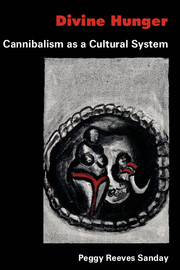1 - Cannibalism cross-culturally
Published online by Cambridge University Press: 05 June 2012
Summary
In recent years … cultural anthropologists have … begun to give the topic [cannibalism] serious analytic attention. This development stems partly from the discovery of new facts and partly from the realization that cannibalism – like incest, aggression, the nuclear family, and other phenomena of universal human import – is a promising ground on which to exercise certain theoretical programs.
Anthropological debate on the subject of cannibalism has revolved around three theoretical programs, each of which provides a distinctly different lens for viewing the details of cannibalism. Psychogenic hypotheses explain cannibalism in terms of the satisfaction of certain psychosexual needs. The materialist hypothesis presents a utilitarian, adaptive model – people adapt to hunger or protein deficiency by eating one another. The third approach follows a hermeneutical path rather than a hypothetico-deductive model in conceptualizing cannibal practice as part of the broader cultural logic of life, death, and reproduction.
In this chapter I show that cannibalism is not a unitary phenomenon but varies with respect to both cultural meaning and cultural content. Cannibalism is never just about eating but is primarily a medium for nongustatory messages – messages having to do with the maintenance, regeneration, and, in some cases, the foundation of the cultural order. In statistical terms, cannibalism can be tied to hunger, but hunger is not necessarily tied to cannibalism (see discussion of Table 5 in this chapter).
- Type
- Chapter
- Information
- Divine HungerCannibalism as a Cultural System, pp. 3 - 26Publisher: Cambridge University PressPrint publication year: 1986
- 1
- Cited by



